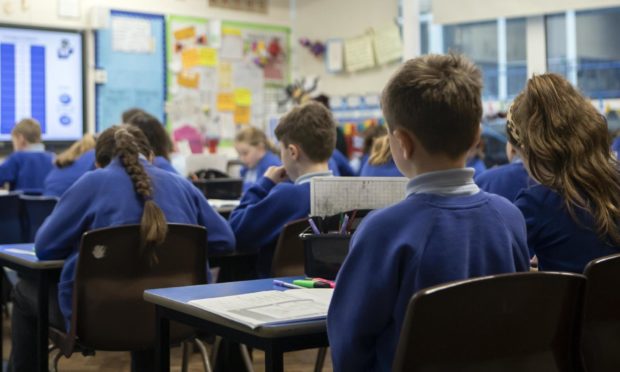Urgent reform is needed of the framework underpinning how children are taught in Scotland’s schools, according to one of its architects.
Under the Curriculum for Excellence both literacy and numeracy have declined, said Keir Bloomer.
And he said Scotland’s best performing schools were those not following CfE guidance.
The Commission for School Reform, an independent group of education experts set up by the Reform Scotland think tank, called for reform of the system in a submission to the Organisation for Economic Cooperation and Development which is reviewing the CfE phase for pre-school to S3.
Group chairman Mr Bloomer said the review would help reassure the public of the quality of Scotland’s schooling.
It is now time we stop pretending that we are doing well…”
Keir Bloomer, chairman of the Commission for School Reform
Several problems were identified by the commission in the implementation of CfE, particularly in secondary schools, and it indicated there was insufficient focus on knowledge in the teaching of Scotland’s children.
Mr Bloomer said: “The truth is that the schools which perform best at the moment are those which have largely ignored the 20,000 pages of guidance which accompanied the implementation of CfE.
“It is critical that this third OECD review of CfE understands the differences between the curriculum as conceived and the curriculum as implemented, which are stark and consequential.
“Scotland’s educational performance has evidentially been moving in the wrong direction during the tenure of CfE.”
He said a substantial decline in maths, reading and science had been recorded by the OECD and a commission survey found a decline in literacy and numeracy at all levels.
He said: “It is now time we stop pretending that we are doing well, and we hope that OECD will, this time, open the bonnet of CfE rather than simply adjudicating on the bodywork.”
What is the curriculum for excellence?
The CfE was implemented 10 years ago and is the national curriculum used in Scotland’s nursery, primary and secondary schools.
Emphasis is placed on inter-disciplinary learning, skills development and encouraging personal achievement.
It is intended to foster four capacities in young people, making them: successful learners, confident individuals, responsible citizens and effective contributors.
CfE has two stages. Broad general education is from early years to S3 and the senior phase from S4 to S6.
The former is divided into five levels – early, first, second, third and fourth – and has eight learning areas – expressive arts, health and wellbeing, languages, mathematics, religious and moral education, sciences, social sciences and technologies.
Benchmarks
During broad general education, the aim is for children and young people to:
- achieve the highest possible levels of literacy, numeracy and cognitive skills;
- develop skills for learning, skills for life and skills for work;
- develop knowledge and understanding of society, the world and Scotland’s place in it;
- experience challenge and success so that they can develop well-informed views and the four capacities.
Benchmarks set out what learners need to know and be able to do to achieve a level in each area.
CfE ‘breadth of learning’
The OECD has been engaging with national stakeholders, schools, practitioners and pupils as it reviews the CfE.
It is due to publish a report of its findings in June next year.
A Scottish Government spokesman said: “Curriculum for excellence ensures children and young people have more options in their education and that their wider achievements and skills are recognised alongside qualifications.
“More young people are achieving at least one Higher or equivalent compared to when CfE was introduced, the number of school leavers who went on to positive destinations such as work, training or further study increased to a record 95% in 2018-19, and 64,274 skills-based qualifications have been awarded this year – up from 37,106 in 2014.
“The breadth of learning delivered by CfE – which helps equip pupils with the knowledge, skills and attributes needed for life in the 21st century – was reflected in the recent PISA [OECD’s Programme for International Student Assessment] global competence assessment, where only two countries achieved a higher average score than Scotland.”
